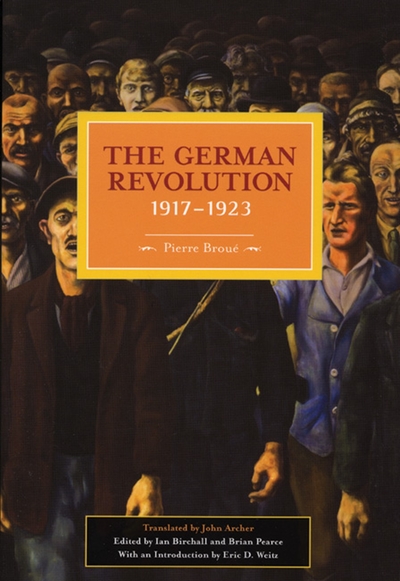Pierre Broué. Translated by John Archer and edited by Ian Birchall and Brian Pearce. With an introduction by Eric D. Weitz.
On 12 October 1923, Grigory Zinoviev, president of the Communist International wrote the following in Pravda:
The German events are developing with the inexorability of fate. The path which it took the Russian Revolution twelve years to cover, from 1906 to 1917, will have taken the German Revolution five years, from 1918 to 1923. … The proletarian revolution is knocking at Germany’s door; you would have to be blind not to see it. … Very soon, everyone will see that this autumn of 1923 is a turning-point, not just for the history of Germany, but for the history of the whole world.
In fact, far from being on the point of triumphing, the German Revolution was on the verge of an irredeemable disaster which would soon inflict terrible consequences on Germany and the world.
In this magisterial work, first published 1971 and still unsurpassed, Pierre Broué meticulously reconstitutes the six decisive years during which — between ‘ultra-leftism and ‘opportunism’, ‘sectarianism’ and ‘revisionism’, ‘activism’ and ‘passivity’ — the German revolutionaries attempted to begin a new chapter in the history of the proletariat.
Biographical note
Pierre Broué (born in 1926) was for many years Professor of Contemporary History at the Institut d’études politiques in Grenoble. A world renowned specialist of the communist and international workers’ movements, he is the founder of the Cahiers Léon Trotsky, editor of Leon Trotsky’s writings in French and the author of many publications, including La Révolution et la guerre en Espagne (with Etienne Témime, 1961), Le Parti bolchevique. Histoire du Parti communiste de l’URSS (1963), Les Procès de Moscou (1965), La Question chinoise dans l’Internationale communiste (1965), Le Printemps des peuples commence à Prague (1969), La Révolution espagnole (1972), L’Assassinat de Trotsky (1980), Trotsky (1988), Staline et la Révolution. Le cas espagnol (1993), Rakovsky ou la Révolution dans tous les pays (1996), Histoire de l’Internationale communiste, 1919-1943 (1997) and Communistes contre Staline. Massacre d’une generation (2003).
Readership
All those interested in History, the German Revolution, Revolutionary Movements, Communism, Marxism.
Table of contents
Abbreviations and Acronyms
Foreword to the English Edition
Preface
1 The Battlefield
2 Social Democracy Before 1914
3 The Lefts in German Social Democracy
PART 1. FROM WAR TO REVOLUTION: THE VICTORY AND DEFEAT OF ULTRA-LEFTISM
4. The War and the Crisis of Social Democracy
5. The Foundation of the Independent Social-Democratic Party
6. The Rise of the Revolutionary Movement
7. Problems of the World Revolution
8. The November Revolution
9. The Period of Dual Power
10. The Crisis on the Socialist Movement
11. The Foundation of the Communist Party of Germany
12. The Uprising of January 1919
PART 2. THE ATTEMPT TO DEFINE THE ROLE OF A COMMUNIST PARTY
13. The Noske Period
14. Stabilisation in Germany and World Revolution
15. The Communist Party After January 1919
16. The Ultra-Left Opposition and the Split
17. The Problem of Cenrism
18. The Kapp Putsch
19. The Communist Party at the Crossroads
20. Moscow and the German Revolutionaries
21. The Great Hopes of 1920
22. Paul Levi: A German Conception of Communism
23. The First Steps of the Unified Communist Party
24. The Split in the Italian Socialist Party
25. The March Action
26. Aftermath of a defeat
27. The Moscow Compromise
PART 3. FROM THE CONQUEST OF THE MASSES TO A DEFEAT WITHOUT A FIGHT
28. Unity Preserved With Difficulty
29. A New Start
30. The Rapallo Turn
31. For the United Front Against Poverty and Reaction
32. The ‘Mass Communist Party’
33. The Worker’s Government
34. The Development of the Tactic
35. The Occupation of the Ruhr
36. Crisis in the KPD
37. An Unprecedented Pre-Revolutionary Situation
38. The Overthrow of the Cuno Government
39 Preparing the Insurrection
40. Moscow’s View of the German Revolution
41. The German October
42. Aftermath of Another Defeat
PART 4. AN UNDERTAKING CONDEMNED BY HISTORY?
43. History and Politics
44. Grafting Bolshevism onto German Stock
45. Paul Levi: The Lost Opportunity?
46. Karl Radek: The Confusion of Styles?
47. Balance Sheet of a Defeat
Chronology
Bibliography
Bibliographical Details


